Tax Implications for Foreigners Investing in Australian Agriculture
VerifiedAdded on 2023/06/04
|7
|1455
|193
Report
AI Summary
This report delves into the tax treatments and implications for foreigners investing in Australian agricultural businesses, focusing on sourced income, tax rates, personal tax offsets, and Medicare levies. It highlights that non-residents are ineligible for tax-free thresholds and may face higher tax rates on their initial income brackets. Restrictions on personal tax offsets and the absence of Medicare levy benefits further impact foreign investors. The report also provides recommendations for relevant law reforms to enhance market efficiency and fairness in the tax system, including specific taxes based on social outcomes, progressivity in the tax system, and potential tax concessions to attract additional foreign investments. This detailed analysis offers valuable insights into the Australian tax landscape for foreign investors in the agricultural sector.
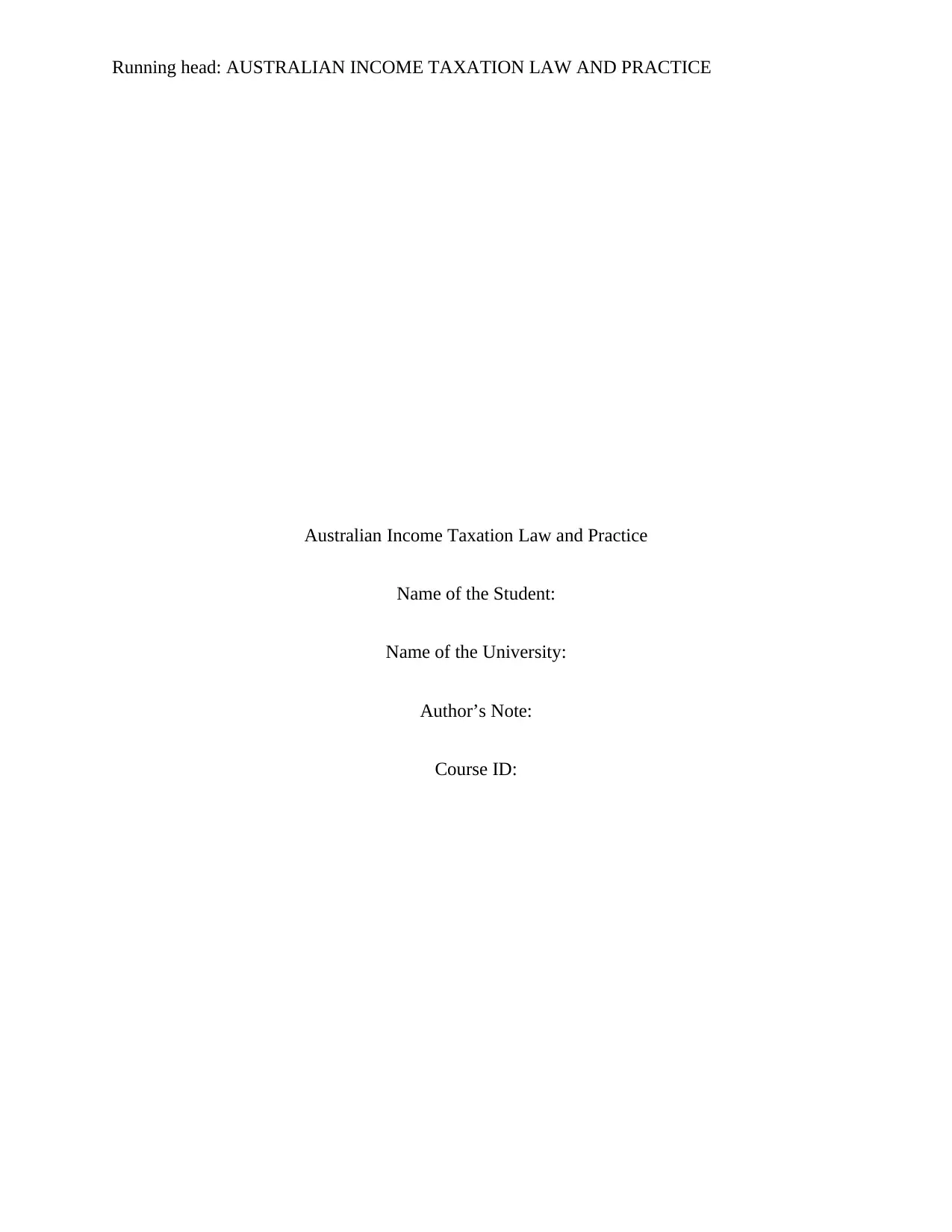
Running head: AUSTRALIAN INCOME TAXATION LAW AND PRACTICE
Australian Income Taxation Law and Practice
Name of the Student:
Name of the University:
Author’s Note:
Course ID:
Australian Income Taxation Law and Practice
Name of the Student:
Name of the University:
Author’s Note:
Course ID:
Paraphrase This Document
Need a fresh take? Get an instant paraphrase of this document with our AI Paraphraser
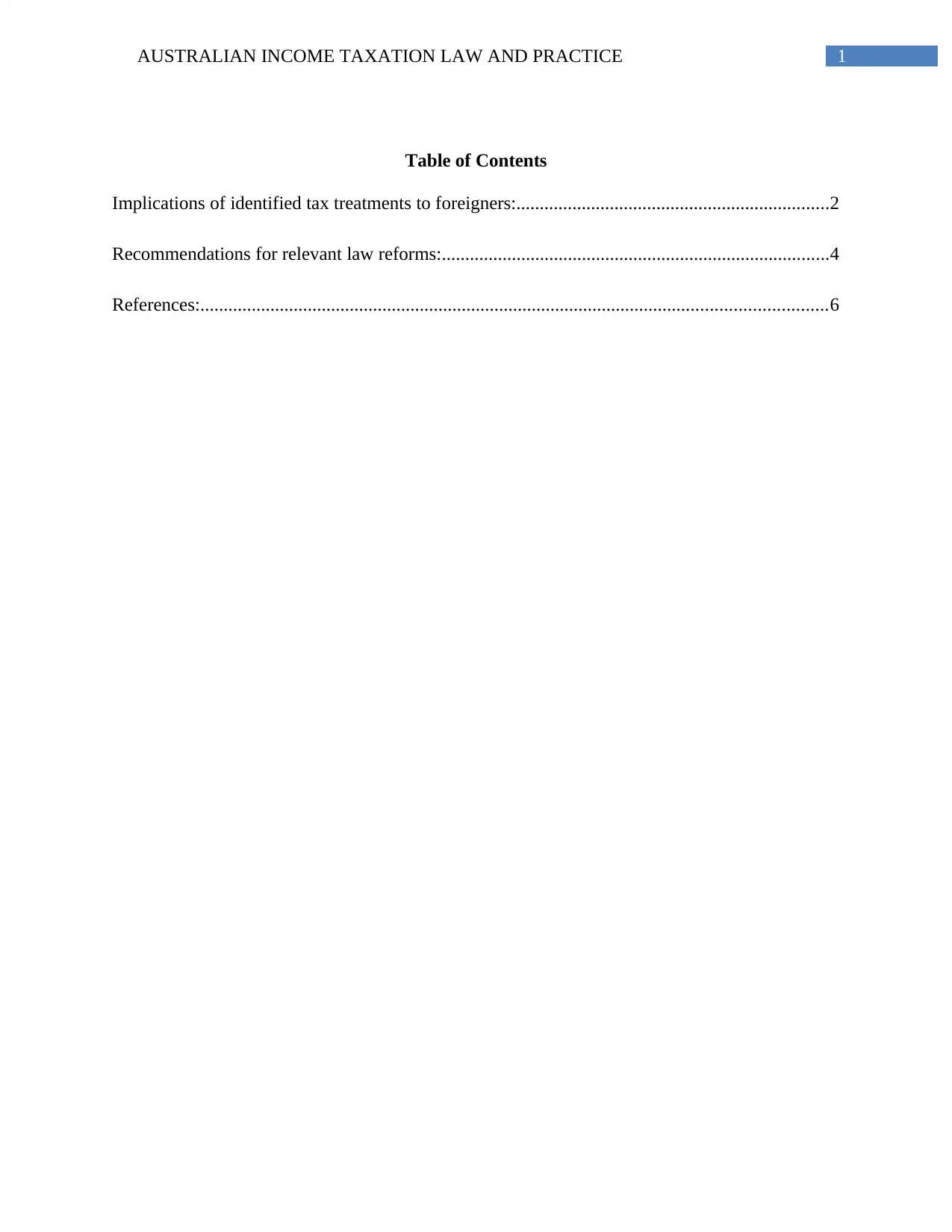
1AUSTRALIAN INCOME TAXATION LAW AND PRACTICE
Table of Contents
Implications of identified tax treatments to foreigners:...................................................................2
Recommendations for relevant law reforms:...................................................................................4
References:......................................................................................................................................6
Table of Contents
Implications of identified tax treatments to foreigners:...................................................................2
Recommendations for relevant law reforms:...................................................................................4
References:......................................................................................................................................6
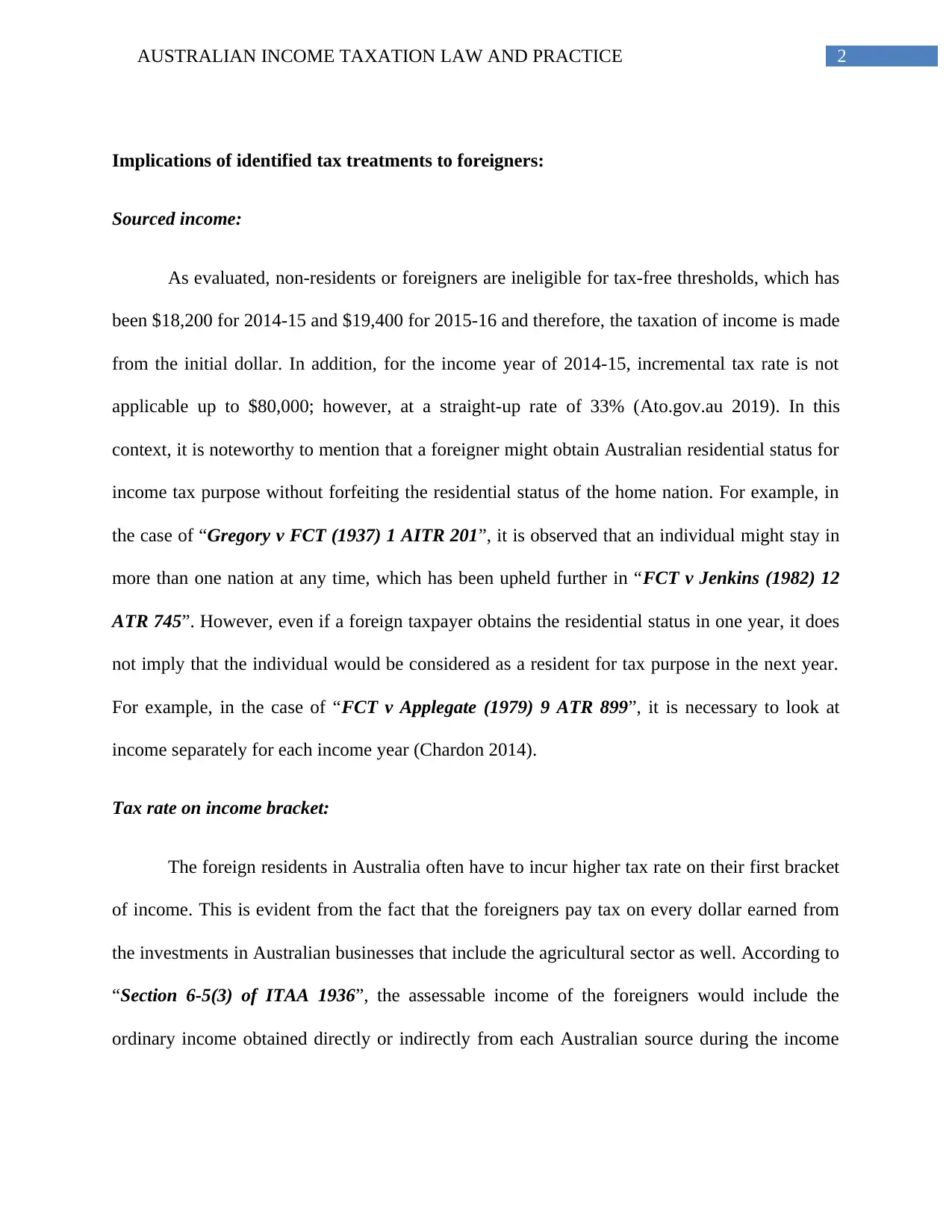
2AUSTRALIAN INCOME TAXATION LAW AND PRACTICE
Implications of identified tax treatments to foreigners:
Sourced income:
As evaluated, non-residents or foreigners are ineligible for tax-free thresholds, which has
been $18,200 for 2014-15 and $19,400 for 2015-16 and therefore, the taxation of income is made
from the initial dollar. In addition, for the income year of 2014-15, incremental tax rate is not
applicable up to $80,000; however, at a straight-up rate of 33% (Ato.gov.au 2019). In this
context, it is noteworthy to mention that a foreigner might obtain Australian residential status for
income tax purpose without forfeiting the residential status of the home nation. For example, in
the case of “Gregory v FCT (1937) 1 AITR 201”, it is observed that an individual might stay in
more than one nation at any time, which has been upheld further in “FCT v Jenkins (1982) 12
ATR 745”. However, even if a foreign taxpayer obtains the residential status in one year, it does
not imply that the individual would be considered as a resident for tax purpose in the next year.
For example, in the case of “FCT v Applegate (1979) 9 ATR 899”, it is necessary to look at
income separately for each income year (Chardon 2014).
Tax rate on income bracket:
The foreign residents in Australia often have to incur higher tax rate on their first bracket
of income. This is evident from the fact that the foreigners pay tax on every dollar earned from
the investments in Australian businesses that include the agricultural sector as well. According to
“Section 6-5(3) of ITAA 1936”, the assessable income of the foreigners would include the
ordinary income obtained directly or indirectly from each Australian source during the income
Implications of identified tax treatments to foreigners:
Sourced income:
As evaluated, non-residents or foreigners are ineligible for tax-free thresholds, which has
been $18,200 for 2014-15 and $19,400 for 2015-16 and therefore, the taxation of income is made
from the initial dollar. In addition, for the income year of 2014-15, incremental tax rate is not
applicable up to $80,000; however, at a straight-up rate of 33% (Ato.gov.au 2019). In this
context, it is noteworthy to mention that a foreigner might obtain Australian residential status for
income tax purpose without forfeiting the residential status of the home nation. For example, in
the case of “Gregory v FCT (1937) 1 AITR 201”, it is observed that an individual might stay in
more than one nation at any time, which has been upheld further in “FCT v Jenkins (1982) 12
ATR 745”. However, even if a foreign taxpayer obtains the residential status in one year, it does
not imply that the individual would be considered as a resident for tax purpose in the next year.
For example, in the case of “FCT v Applegate (1979) 9 ATR 899”, it is necessary to look at
income separately for each income year (Chardon 2014).
Tax rate on income bracket:
The foreign residents in Australia often have to incur higher tax rate on their first bracket
of income. This is evident from the fact that the foreigners pay tax on every dollar earned from
the investments in Australian businesses that include the agricultural sector as well. According to
“Section 6-5(3) of ITAA 1936”, the assessable income of the foreigners would include the
ordinary income obtained directly or indirectly from each Australian source during the income
⊘ This is a preview!⊘
Do you want full access?
Subscribe today to unlock all pages.

Trusted by 1+ million students worldwide
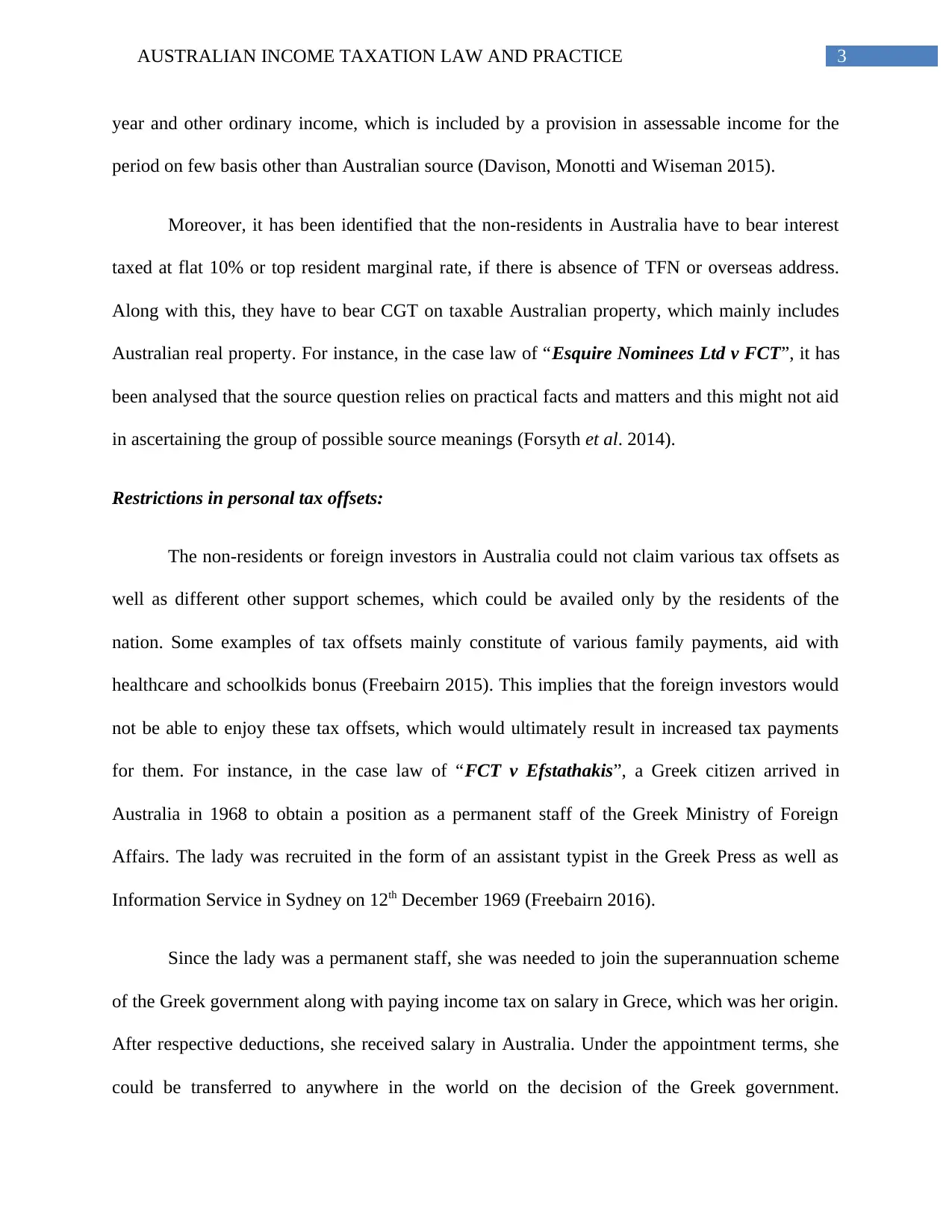
3AUSTRALIAN INCOME TAXATION LAW AND PRACTICE
year and other ordinary income, which is included by a provision in assessable income for the
period on few basis other than Australian source (Davison, Monotti and Wiseman 2015).
Moreover, it has been identified that the non-residents in Australia have to bear interest
taxed at flat 10% or top resident marginal rate, if there is absence of TFN or overseas address.
Along with this, they have to bear CGT on taxable Australian property, which mainly includes
Australian real property. For instance, in the case law of “Esquire Nominees Ltd v FCT”, it has
been analysed that the source question relies on practical facts and matters and this might not aid
in ascertaining the group of possible source meanings (Forsyth et al. 2014).
Restrictions in personal tax offsets:
The non-residents or foreign investors in Australia could not claim various tax offsets as
well as different other support schemes, which could be availed only by the residents of the
nation. Some examples of tax offsets mainly constitute of various family payments, aid with
healthcare and schoolkids bonus (Freebairn 2015). This implies that the foreign investors would
not be able to enjoy these tax offsets, which would ultimately result in increased tax payments
for them. For instance, in the case law of “FCT v Efstathakis”, a Greek citizen arrived in
Australia in 1968 to obtain a position as a permanent staff of the Greek Ministry of Foreign
Affairs. The lady was recruited in the form of an assistant typist in the Greek Press as well as
Information Service in Sydney on 12th December 1969 (Freebairn 2016).
Since the lady was a permanent staff, she was needed to join the superannuation scheme
of the Greek government along with paying income tax on salary in Grece, which was her origin.
After respective deductions, she received salary in Australia. Under the appointment terms, she
could be transferred to anywhere in the world on the decision of the Greek government.
year and other ordinary income, which is included by a provision in assessable income for the
period on few basis other than Australian source (Davison, Monotti and Wiseman 2015).
Moreover, it has been identified that the non-residents in Australia have to bear interest
taxed at flat 10% or top resident marginal rate, if there is absence of TFN or overseas address.
Along with this, they have to bear CGT on taxable Australian property, which mainly includes
Australian real property. For instance, in the case law of “Esquire Nominees Ltd v FCT”, it has
been analysed that the source question relies on practical facts and matters and this might not aid
in ascertaining the group of possible source meanings (Forsyth et al. 2014).
Restrictions in personal tax offsets:
The non-residents or foreign investors in Australia could not claim various tax offsets as
well as different other support schemes, which could be availed only by the residents of the
nation. Some examples of tax offsets mainly constitute of various family payments, aid with
healthcare and schoolkids bonus (Freebairn 2015). This implies that the foreign investors would
not be able to enjoy these tax offsets, which would ultimately result in increased tax payments
for them. For instance, in the case law of “FCT v Efstathakis”, a Greek citizen arrived in
Australia in 1968 to obtain a position as a permanent staff of the Greek Ministry of Foreign
Affairs. The lady was recruited in the form of an assistant typist in the Greek Press as well as
Information Service in Sydney on 12th December 1969 (Freebairn 2016).
Since the lady was a permanent staff, she was needed to join the superannuation scheme
of the Greek government along with paying income tax on salary in Grece, which was her origin.
After respective deductions, she received salary in Australia. Under the appointment terms, she
could be transferred to anywhere in the world on the decision of the Greek government.
Paraphrase This Document
Need a fresh take? Get an instant paraphrase of this document with our AI Paraphraser
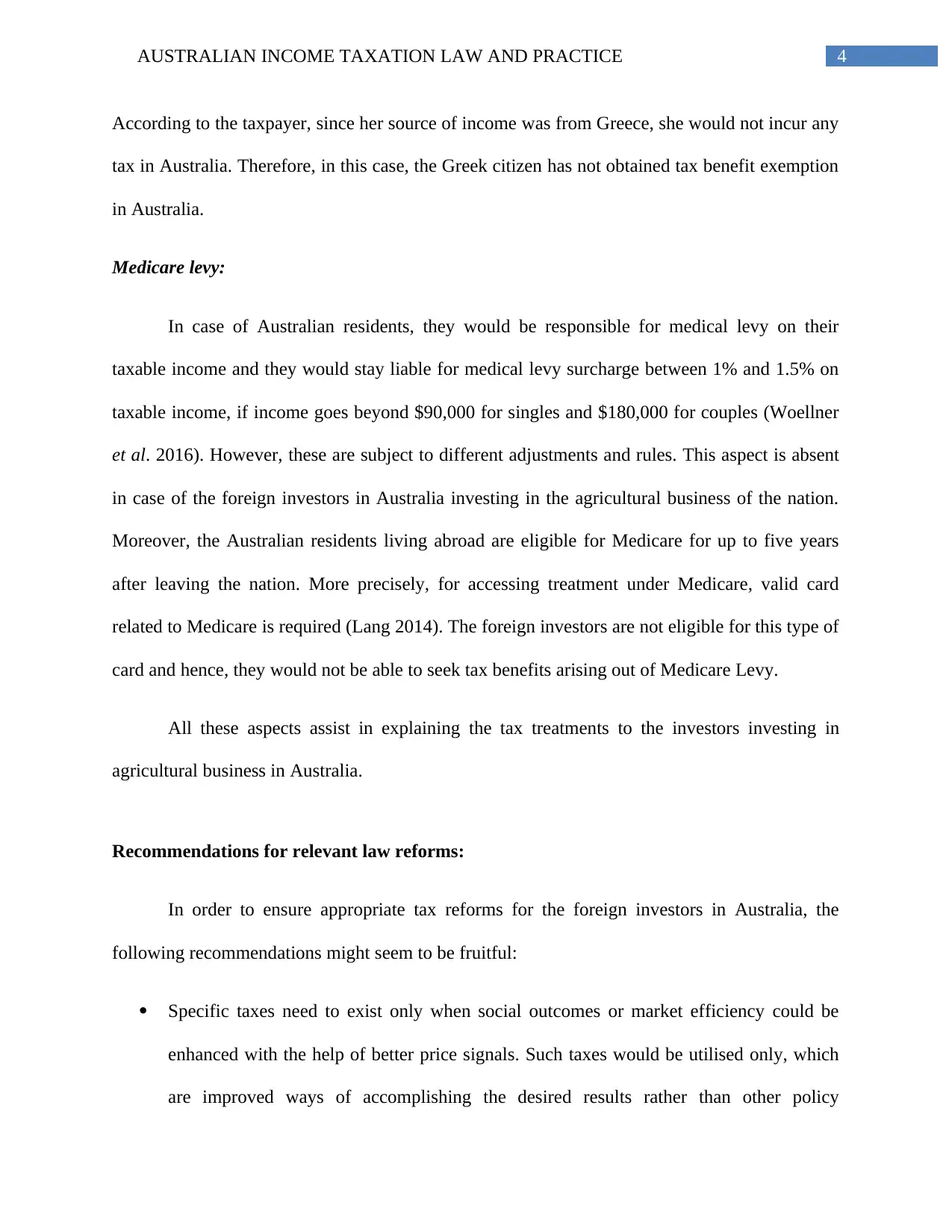
4AUSTRALIAN INCOME TAXATION LAW AND PRACTICE
According to the taxpayer, since her source of income was from Greece, she would not incur any
tax in Australia. Therefore, in this case, the Greek citizen has not obtained tax benefit exemption
in Australia.
Medicare levy:
In case of Australian residents, they would be responsible for medical levy on their
taxable income and they would stay liable for medical levy surcharge between 1% and 1.5% on
taxable income, if income goes beyond $90,000 for singles and $180,000 for couples (Woellner
et al. 2016). However, these are subject to different adjustments and rules. This aspect is absent
in case of the foreign investors in Australia investing in the agricultural business of the nation.
Moreover, the Australian residents living abroad are eligible for Medicare for up to five years
after leaving the nation. More precisely, for accessing treatment under Medicare, valid card
related to Medicare is required (Lang 2014). The foreign investors are not eligible for this type of
card and hence, they would not be able to seek tax benefits arising out of Medicare Levy.
All these aspects assist in explaining the tax treatments to the investors investing in
agricultural business in Australia.
Recommendations for relevant law reforms:
In order to ensure appropriate tax reforms for the foreign investors in Australia, the
following recommendations might seem to be fruitful:
Specific taxes need to exist only when social outcomes or market efficiency could be
enhanced with the help of better price signals. Such taxes would be utilised only, which
are improved ways of accomplishing the desired results rather than other policy
According to the taxpayer, since her source of income was from Greece, she would not incur any
tax in Australia. Therefore, in this case, the Greek citizen has not obtained tax benefit exemption
in Australia.
Medicare levy:
In case of Australian residents, they would be responsible for medical levy on their
taxable income and they would stay liable for medical levy surcharge between 1% and 1.5% on
taxable income, if income goes beyond $90,000 for singles and $180,000 for couples (Woellner
et al. 2016). However, these are subject to different adjustments and rules. This aspect is absent
in case of the foreign investors in Australia investing in the agricultural business of the nation.
Moreover, the Australian residents living abroad are eligible for Medicare for up to five years
after leaving the nation. More precisely, for accessing treatment under Medicare, valid card
related to Medicare is required (Lang 2014). The foreign investors are not eligible for this type of
card and hence, they would not be able to seek tax benefits arising out of Medicare Levy.
All these aspects assist in explaining the tax treatments to the investors investing in
agricultural business in Australia.
Recommendations for relevant law reforms:
In order to ensure appropriate tax reforms for the foreign investors in Australia, the
following recommendations might seem to be fruitful:
Specific taxes need to exist only when social outcomes or market efficiency could be
enhanced with the help of better price signals. Such taxes would be utilised only, which
are improved ways of accomplishing the desired results rather than other policy
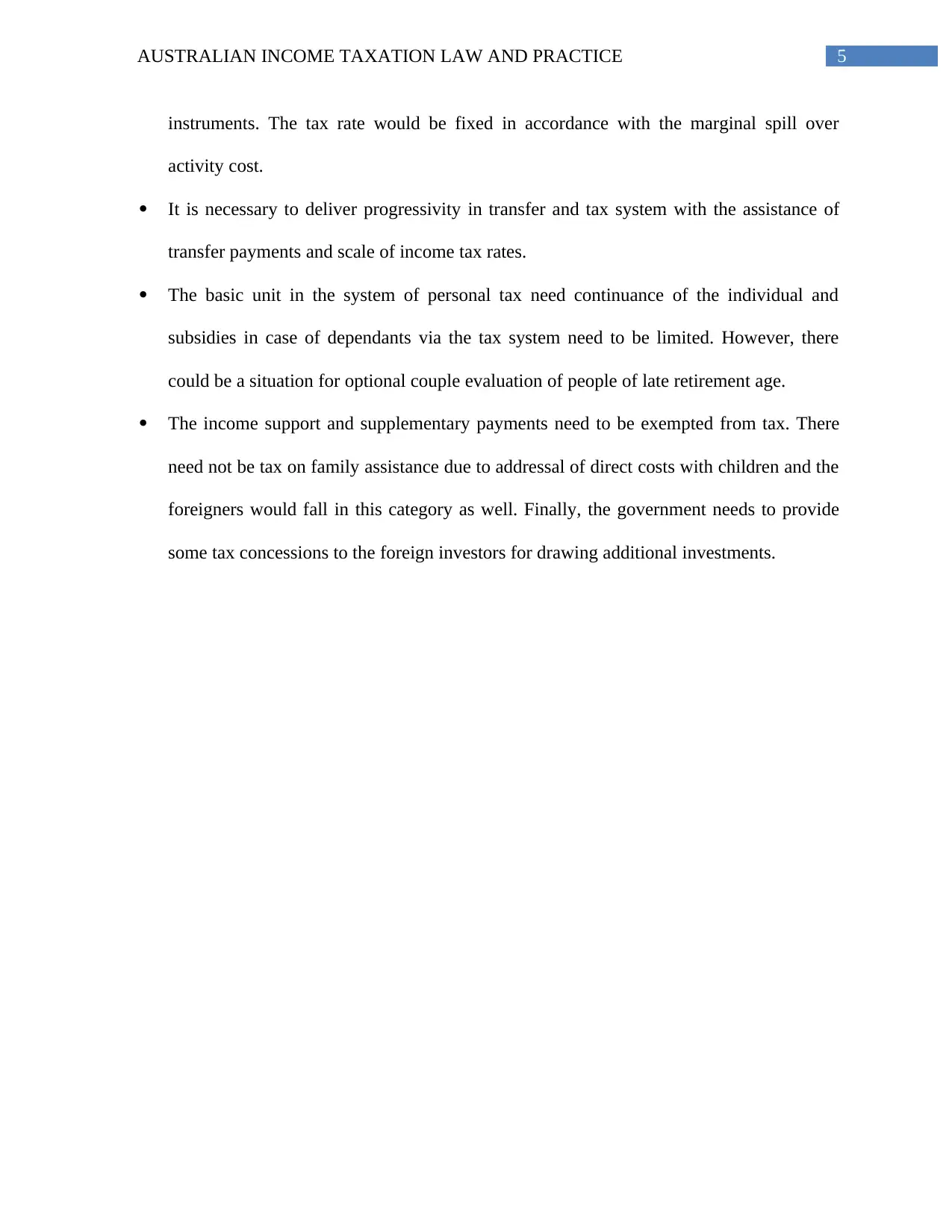
5AUSTRALIAN INCOME TAXATION LAW AND PRACTICE
instruments. The tax rate would be fixed in accordance with the marginal spill over
activity cost.
It is necessary to deliver progressivity in transfer and tax system with the assistance of
transfer payments and scale of income tax rates.
The basic unit in the system of personal tax need continuance of the individual and
subsidies in case of dependants via the tax system need to be limited. However, there
could be a situation for optional couple evaluation of people of late retirement age.
The income support and supplementary payments need to be exempted from tax. There
need not be tax on family assistance due to addressal of direct costs with children and the
foreigners would fall in this category as well. Finally, the government needs to provide
some tax concessions to the foreign investors for drawing additional investments.
instruments. The tax rate would be fixed in accordance with the marginal spill over
activity cost.
It is necessary to deliver progressivity in transfer and tax system with the assistance of
transfer payments and scale of income tax rates.
The basic unit in the system of personal tax need continuance of the individual and
subsidies in case of dependants via the tax system need to be limited. However, there
could be a situation for optional couple evaluation of people of late retirement age.
The income support and supplementary payments need to be exempted from tax. There
need not be tax on family assistance due to addressal of direct costs with children and the
foreigners would fall in this category as well. Finally, the government needs to provide
some tax concessions to the foreign investors for drawing additional investments.
⊘ This is a preview!⊘
Do you want full access?
Subscribe today to unlock all pages.

Trusted by 1+ million students worldwide
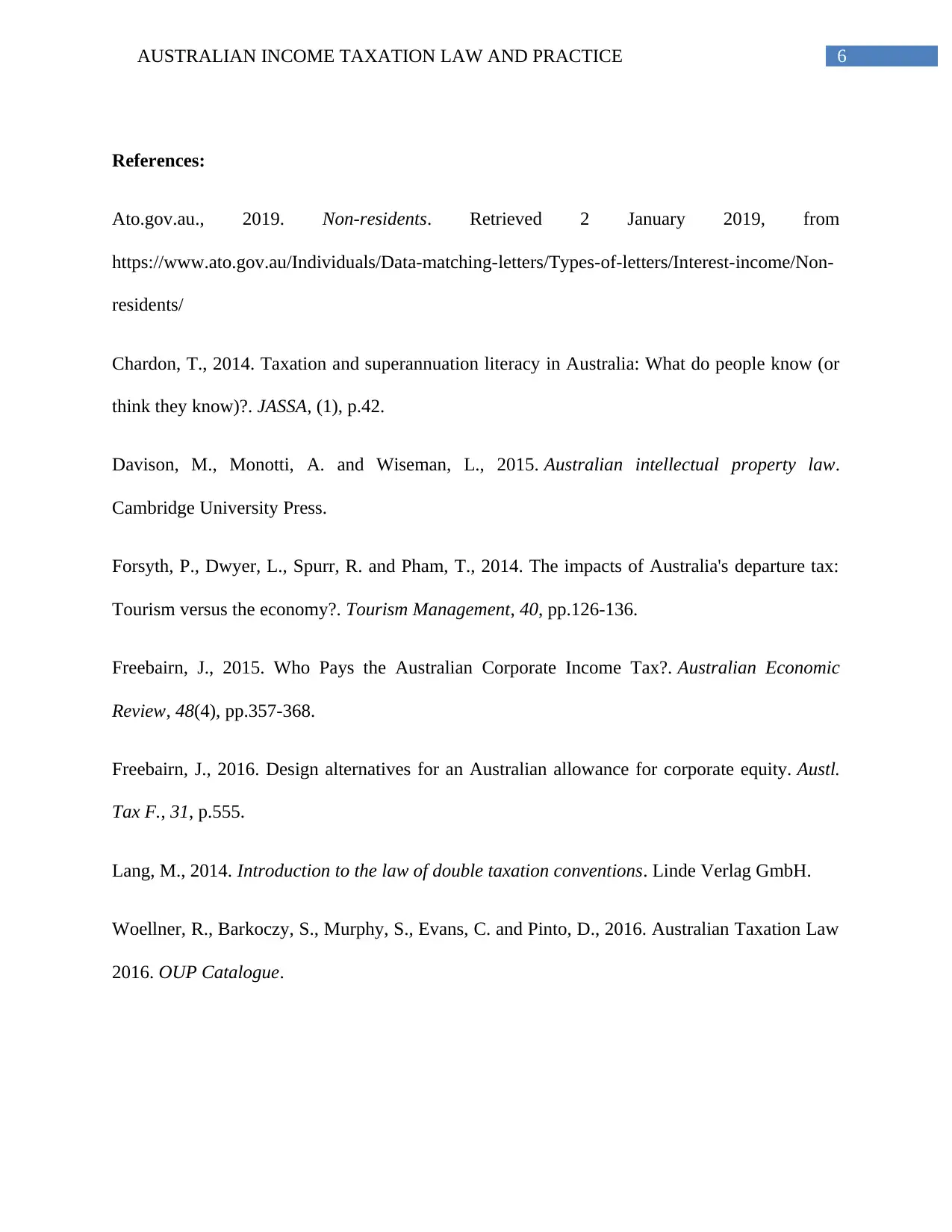
6AUSTRALIAN INCOME TAXATION LAW AND PRACTICE
References:
Ato.gov.au., 2019. Non-residents. Retrieved 2 January 2019, from
https://www.ato.gov.au/Individuals/Data-matching-letters/Types-of-letters/Interest-income/Non-
residents/
Chardon, T., 2014. Taxation and superannuation literacy in Australia: What do people know (or
think they know)?. JASSA, (1), p.42.
Davison, M., Monotti, A. and Wiseman, L., 2015. Australian intellectual property law.
Cambridge University Press.
Forsyth, P., Dwyer, L., Spurr, R. and Pham, T., 2014. The impacts of Australia's departure tax:
Tourism versus the economy?. Tourism Management, 40, pp.126-136.
Freebairn, J., 2015. Who Pays the Australian Corporate Income Tax?. Australian Economic
Review, 48(4), pp.357-368.
Freebairn, J., 2016. Design alternatives for an Australian allowance for corporate equity. Austl.
Tax F., 31, p.555.
Lang, M., 2014. Introduction to the law of double taxation conventions. Linde Verlag GmbH.
Woellner, R., Barkoczy, S., Murphy, S., Evans, C. and Pinto, D., 2016. Australian Taxation Law
2016. OUP Catalogue.
References:
Ato.gov.au., 2019. Non-residents. Retrieved 2 January 2019, from
https://www.ato.gov.au/Individuals/Data-matching-letters/Types-of-letters/Interest-income/Non-
residents/
Chardon, T., 2014. Taxation and superannuation literacy in Australia: What do people know (or
think they know)?. JASSA, (1), p.42.
Davison, M., Monotti, A. and Wiseman, L., 2015. Australian intellectual property law.
Cambridge University Press.
Forsyth, P., Dwyer, L., Spurr, R. and Pham, T., 2014. The impacts of Australia's departure tax:
Tourism versus the economy?. Tourism Management, 40, pp.126-136.
Freebairn, J., 2015. Who Pays the Australian Corporate Income Tax?. Australian Economic
Review, 48(4), pp.357-368.
Freebairn, J., 2016. Design alternatives for an Australian allowance for corporate equity. Austl.
Tax F., 31, p.555.
Lang, M., 2014. Introduction to the law of double taxation conventions. Linde Verlag GmbH.
Woellner, R., Barkoczy, S., Murphy, S., Evans, C. and Pinto, D., 2016. Australian Taxation Law
2016. OUP Catalogue.
1 out of 7
Related Documents
Your All-in-One AI-Powered Toolkit for Academic Success.
+13062052269
info@desklib.com
Available 24*7 on WhatsApp / Email
![[object Object]](/_next/static/media/star-bottom.7253800d.svg)
Unlock your academic potential
Copyright © 2020–2026 A2Z Services. All Rights Reserved. Developed and managed by ZUCOL.





